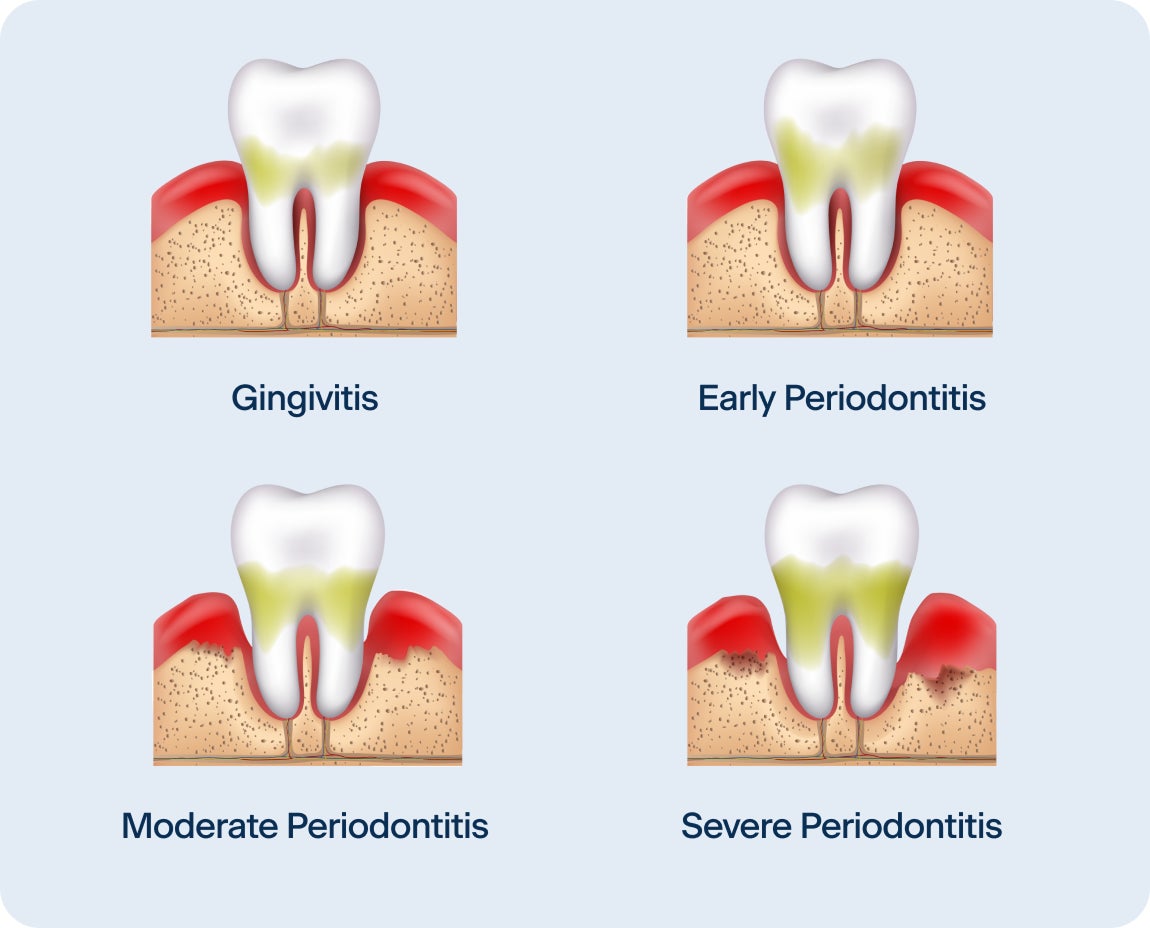Last updated 10.23.2025
Periodontal disease: Signs, treatment and prevention
Learn what periodontal (gum) disease is — signs, diagnosis, treatment, recovery, and costs, and when to see a provider.

Learn more about Dr. Max Smith III

As a leading provider of dental implants for over 20 years, ClearChoice dentists have treated many patients with periodontitis, and restored their smiles. Periodontitis is the most common reason adults lose their teeth. In the US, at age 30, 42% of adults have periodontal disease and at age 65, 59% of adults have periodontal disease. This includes up to10% with severe periodontitis and tooth loss.¹
Together, we'll understand the signs of periodontal disease, how it is diagnosed and the basics of treatment. This guide also covers tips for home care and prevention to help you maintain a smile built for life, with ClearChoice Dental Implant Center at your side.
¹National Institute of Dental and Craniofacial Research - Periodontal Disease in Adults (Age 30 or Older)
What is periodontal (gum) disease?
Periodontal disease, often called gum disease, is an infection of the gum tissues that hold your teeth in place. Gingivitis is the earliest stage of gum disease, caused by an excess buildup of plaque. It's usually reversible with professional cleaning and improved daily hygiene. Though it's the mildest form of gum disease, gingivitis can advance to periodontitis if left untreated.
Periodontitis is a more serious condition that does severe damage over time, to the tissues and bone that support your teeth. This can lead to bone loss, loose teeth, and eventually tooth loss.
Gingivitis vs. Periodontitis
Gingivitis
Advanced stage of gum disease
Early stage of gum disease
Gums look red, swollen, may bleed easily
Caused by plaque buildup on teeth
Reversible with professional cleaning + better home care
No bone loss yet
A warning sign — act early to protect your gums
Periodontitis
Advanced stage of gum disease
Gums pull away from teeth, forming periodontal pockets that are visible as bone loss on x-rays
Infection spreads deeper, damaging bone and fibers that attach the tooth root to the bone. Harmful bacteria growing deep in the pockets
Permanent damage to gum tissue and bone
Bone loss, loose teeth, or tooth loss possible
A serious condition — requires ongoing treatment
Why early diagnosis matters
Recognizing the periodontal disease symptoms early can help you get treatment before the condition worsens.
Think of gingivitis as a warning sign—your gums are inflamed but the underlying bone is still healthy. Periodontitis means the infection has started to damage the bone—catching it early is key.
Signs and symptoms to watch for
Early warning signs
The initial signs of gum disease are often mild and can be easy to overlook. Keep a lookout for:
Gums that bleed when you brush or floss
Red, swollen or tender gums
Persistent bad breath or a bad taste in your mouth
Signs of advanced disease
As periodontitis progresses, the symptoms of gum disease become more obvious. These can include:
Receding gums, making your teeth look longer
Loose or shifting teeth, gaps develop between your teeth
Changes in the way your teeth fit together when you bite
Pus between your teeth and gums
Loose or fallen teeth
Without treatment, advanced periodontal disease can cause complications, like significant gum recession, changes in your bite, and tooth mobility (the loosening of a tooth within its socket). These will need more complex interventions.
What causes periodontal disease?
There are a few contributors to gum disease, from bacteria to lifestyle habits.
Plaque/biofilm basics
The main cause of periodontal disease is plaque, a sticky film of bacteria that forms on your teeth. When you don't remove plaque, it hardens into tartar, which only a dental professional can remove. The bacteria in plaque and tartar produce toxins that irritate the gums and trigger an inflammatory response.
Risk factors
Certain other factors can increase your risk of developing gum disease, including:
Smoking or using other tobacco products
Diabetes
Certain medications that reduce saliva flow
Genetics
Hormonal changes in women and girls
Other illnesses and their treatments
Stages of periodontitis

Gingivitis
Initial stage of gum disease
Inflammation and redness of the gums
Reversible with proper oral hygiene
Early periodontitis
Bone loss begins to occur
Deeper gum pockets form
Increased sensitivity and bleeding.
Moderate periodontitis
Bone loss continues and deepens
Loose teeth may develop
Increased risk of tooth loss
Advanced periodontitis
Severe bone loss and tooth loss
Pus formation and bad breath
May require surgery or other advanced treatments, up to and including removing the loose teeth
How dentists diagnose periodontal disease
Gum disease can be diagnosed during a routine dental check-up using specific evaluation methods. If the case is severe enough, your dentist may refer you to a periodontist.
The highly experienced prosthodontists in ClearChoice Dental Implant Centers specialize in dental implants, but we understand that the remaining teeth and oral environment must be returned to good health to remove the harmful bacteria living in the mouth. These same bacteria can insult an implant overtime. ClearChoice will refer you to a periodontist or to a general dentist to offer treatment for the gum disease that led to your tooth loss in the first place.
Periodontal charting and probing depths
A small measuring tool called a periodontal probe will measure the depth of the space between your teeth and gums. Healthy gums have shallow pockets (typically 1-3 millimeters) while deeper periodontal pockets can indicate disease.
The probing depths directly measure the extent of gum detachment and pocket formation. The dentist keeps an ongoing chart of these pocket probing depths to monitor the success of the periodontal treatment.
X-rays to evaluate bone levels
While the probe measures the pockets around your teeth, X-rays see the bone. By examining what's happening below the gumline, your dentist will determine if there's any bone loss.
How a dentist confirms periodontal disease
Your dentist combines the findings from periodontal charting and X-rays. Deeper pockets and visible bone loss confirm a diagnosis of periodontitis. From there, your care team creates the right treatment plan for you.
Treatments: Non-surgical first, surgery when indicated
The goal of periodontal disease treatment is to control the infection, stop the disease from progressing, and restore gum health.
Non-surgical approaches
Treatment often begins with a less invasive, non-surgical approach. The most common is scaling and root planing. Root planing is a deep-cleaning procedure where your provider removes plaque and tartar from above and below the gumline on the tooth roots. The process also smooths the tooth roots and sometimes this treatment allows the gums to reattach and can lessen the depth of the pocket.
In some cases, doctors may use oral antibiotics and antibiotic solutions placed within the pockets to help control the infection.
Surgical options your periodontist may consider
If other treatment isn't enough to manage the more advanced stages of periodontitis, your provider may recommend surgery. Surgical options can reduce pocket depth, regenerate lost bone and tissue, or graft soft tissue to cover exposed roots. These procedures rarely put the tooth, bone and gum tissues “back to its original condition”. Ideally prevention and early detection are key.
Treatments: Non-surgical first, surgery when indicated
Your daily habits go hand in hand with your oral health. Here's how you can help manage periodontal disease and lessen the risk of it coming back.
Consistent and proper oral hygiene is your first line of defense. What you do at home every day is just as important as any dental treatment. This includes brushing twice a day with a soft-bristled toothbrush. Flossing between your teeth daily is also key to remove plaque. There are also over the counter oral rinses that assist in controlling oral bacteria.
Schedule regular checkups
After active periodontal disease treatment, it's incredibly important to keep regular follow-up appointments. Schedule a maintenance visit every three to four months, so that your dental team can monitor your gum health, clean areas you might miss, and keep the disease from returning.
Periodontal disease and dental implants
The health of your gums and jawbone is the foundation for a successful implant. That’s why if periodontitis has led to tooth loss, ClearChoice will discuss replacement options after the disease and its harmful bacteria are under control.
When it’s time to restore your smile, ClearChoice is here for you. We’re the leading provider of dental implant restorations, pioneering the field for 20 years. If you're eligible for dental implant treatment, replacement options can range from single-tooth implants to full-arch implant solutions. Whatever your before, there's an after. If you're struggling with tooth loss, schedule your consultation with ClearChoice, and take your first step toward a smile built for life.
Implant eligibility after disease control
First, we need to eliminate the infection and stabilize your gum health. Your provider will perform a thorough evaluation, including X-rays and clinical measurements, to confirm that the disease is in remission. It’s doubly important to treat gum disease before your implant treatment; not only do dental implants need a stable foundation, but the same bacteria that cause gum disease can also lead to a condition known as peri-implantitis.
Protecting implants with ongoing maintenance
You need to take care of dental implants just like you would natural teeth. It’s about protecting your oral health as much as it’s about protecting your investment.
Implant restorations can still accumulate plaque and tartar, and the surrounding gum tissue can get inflamed if you don’t keep up your oral hygiene.
Your providers might suggest cleaning appointments every 3-6 months so we can monitor your implants, clean hard-to-reach areas, and keep an eye on your gums. This will lessen the risk of complications, and keep you enjoying your new smile for years to come.
Periodontal disease FAQs
Can teeth be saved if you have periodontitis?
Yes, in many cases, teeth can be saved with timely and appropriate periodontal disease treatment and consistent maintenance.
Will removing teeth stop periodontal disease?
Removing a tooth eliminates the site of infection around that specific tooth. However, it doesn't treat the disease affecting your other teeth. The focus is on saving teeth whenever possible.
How long until gingivitis turns into periodontitis?
There is no set timeline. For some, it can take months; for others, it could be years. Since periodontitis can cause tooth loss, keep up your regular dental visits.
Is periodontal disease considered medical or dental?
It is a dental condition, but because it is an infection that can affect your overall health, it has medical implications.
Can I live a long life with periodontal disease?
Yes. With proper management, treatment and ongoing care, individuals with periodontal disease can maintain their teeth and overall health for a lifetime.



